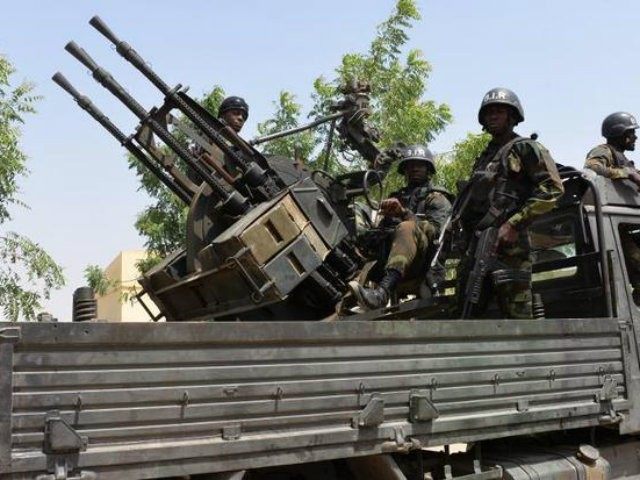President Obama announced Wednesday that 300 U.S. troops will be deployed to Cameroon to fight the ISIS-affiliated Boko Haram terrorist group. The troops will work to establish a base from which to fly Predator drones into the northeast Nigerian enclave in which Boko Haram is headquartered.
In a letter to Congress, the President noted that 90 troops were deployed to Cameroon on Monday–though military officials would not specify where in the west African nation–and would eventually be joined by 210 more. The group “will conduct airborne intelligence, surveillance, and reconnaissance operations in the region.” They are to be deployed in Cameroon until “they are no longer needed.”
The Washington Post reports that the troops will specifically be working on setting up a drone base to track the fighters hidden in Nigeria’s dense Sambisa Forest, in Borno state. The forest has provided Boko Haram with both a base from which to operate and hide kidnapped women and children, as well as cover from the Nigerian military when they run short of ammunition.
“We obviously take the threat, the terror threat from Boko Haram in Africa, seriously,” White House Press Secretary Josh Earnest told reporters on Wednesday.
While the operation will be based in Cameroon, Nigerian President Muhammadu Buhari has issued a statement calling the deployment a “welcome development” in the fight against Boko Haram. Buhari had issued a statement on Wednesday before the announcement, asserting that his military–along with a coalition that includes troops from Cameroon, Chad, Niger, and Benin–would eradicate the terrorist group entirely by December.
“We must thank the United States of America for sending training teams and equipment to us. The positive results of our collaboration are evident,” Buhari said, following a meeting with U.S. Africa Commander Gen. David M. Rodríguez.
Buhari’s embrace of American aid contrasts with statements earlier in the year in which he expressed frustration that the American military had not helped Nigeria sufficiently following accusations of human rights violations by Nigerian soldiers. “Unwittingly, and I dare say unintentionally, the application of the Leahy Law Amendment by the United States government has aided and abetted the Boko Haram terrorists,” Buhari said, referring to a law that prohibits the U.S. from aiding militaries under human rights review.
In August, Buhari announced his three-month ultimatum on eliminating Boko Haram. Since then, military spokesmen have reiterated after nearly every Boko Haram event that the group is growing desperate and spending less time properly organizing its attacks. When suspected Boko Haram terrorists were arrested in southeastern Lagos city for the first time, a Nigerian military spokesman claimed it was a sign of desperation that they would run so far from Maiduguri, Borno, where the group is based. Former captives have corroborated this argument; in May, a woman liberated by Nigerian troops claimed the group was fully “in disarray,” unable to find fuel or ammunition with which to fight.
It appeared Thursday that Boko Haram needs reinforcements, as they urged neighboring jihadi operation al-Shabaab to join in their terrorist activity. Al-Shabaab, which operates out of Somalia, has traditionally been linked to al-Qaeda, while Boko Haram’s leader Abubakar Shekau pledged allegiance to Islamic State “Caliph” Abu Bakr al-Baghdadi. In a message published Thursday, an unnamed Boko Haram member praised al-Shabaab as “brothers” and called for them to expand their terrorism deeper into Kenya, Tanzania, and Ethiopia.
The Islamic State directly reached out to al-Shabaab in March, before Boko Haram had pledged allegiance to the terrorist group, but al-Shabaab leaders did not respond.

COMMENTS
Please let us know if you're having issues with commenting.